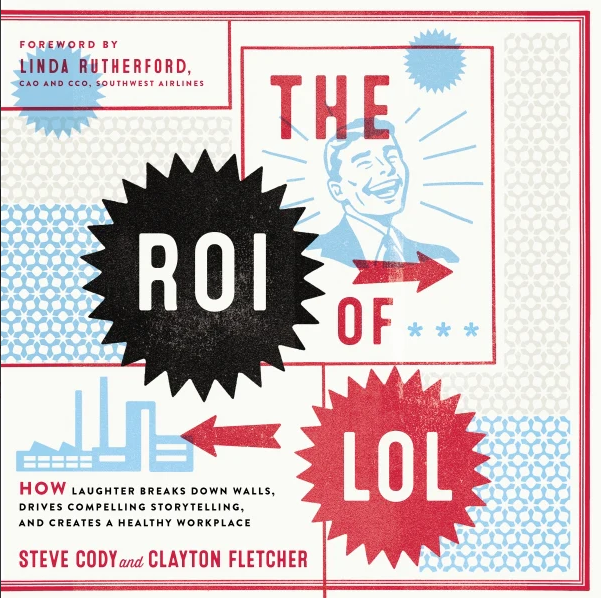The importance of laughing at work
Peppercomm founder and CEO Steve Cody and comedian Clayton Fletcher share an excerpt from their upcoming book, “The ROI of LOL“.

Steve Cody is the founder and chief executive officer of Peppercomm, a strategic communications agency he named in honor of his late Black Lab, Pepper. In his role as CEO, Cody is responsible for driving everything from thought leadership and new service offerings to crisis counseling and workplace culture. He led the introduction of unique humor-based storytelling training to the market that’s aimed at helping employees use humor to increase productivity and find joy in the workplace.
Heard every day on Sirius/XM Radio’s Laugh USA, Blue Collar Comedy, and Jamie Foxx’s Foxxhole stations, Clayton Fletcher is an American stand-up comedian who lives in New York City and performs throughout the USA, Europe, Australia, Asia, and the Caribbean. Fletcher has taught thousands of aspiring comedians (and thousands of brave businesspeople) how to unlock the prodigious power of truth in comedy. He has served as Chief Comedy Officer at Peppercomm for 15 years.
We’ve all heard that laughter is good medicine. We know that laughter relieves stress, increases oxygen flow, and boosts overall health. In the American Physiological Society’s excellent journal Advances in Physiology Education, we learn that laughter “is part of a universal language of basic emotions that all humans recognize.” We know about the countless other studies that have been done to support the idea of getting your high-dosage laughter prescription refilled as often as possible. Most of all, we know that laughing feels good. But have you ever considered why?
There are many neuroscientific explanations for why going ha ha ha makes us feel so great, and they all revolve around the healing power of peptides like oxytocin and neurotransmitters like serotonin. These “feel good” chemicals trigger the release of endorphins, which are hormones in the brain that activate opiate receptors throughout your body and mind. Endorphins ease pain in the body, reduce stress, and create a sense of euphoria. They are seven times more powerful than morphine, and they’re much easier to get.
The six ways to achieve the natural high of an endorphin rush are
- Aerobic exercise
- Consuming certain foods like dark chocolate
- Adrenaline-based activities like skydiving
- Narcotics, including heroin and cocaine (which we don’t recommend)
- Laughing out loud
- Our favorite, falling in love
It’s important to note that in the moment of endorphin release, the brain does not differentiate among the various stimuli. This means that, in a very real way, when someone makes you laugh, you fall in love with that person for a moment. If you really want someone to fall in love with you, tell her a joke while feeding her chocolate while she’s bungee jumping off a StairMaster!
Comedians see this “love potion” effect of laughter every night in comedy clubs around the world. It’s very common for audience members to line up to request hugs from a hilarious performer or possibly even tell their life stories, despite not having even officially met. Of course, the two-drink minimum helps with this, but something else is at play: the bonding effect of sharing a laugh.
Think about your best friend or someone else you really love to have around you. We’re willing to bet that you and that person share a similar sense of humor. Perhaps you both enjoy the same Kevin Hart movie or agree on which Amy Schumer punch line is the funniest. Maybe you even share inside jokes about someone in your group chat’s new boyfriend. You have probably laughed together more than once about a pet peeve you have in common. Laughter is a powerful bonding agent indeed.
Rupen Desai, cofounder of The Shed 28 and former chief marketing officer (CMO) at Dole Sunshine Company, takes this idea even further, and unapologetically so: “I have a rule to only work with people I like. Yeah, and I know this is terribly wrong because business forces you to work with people whose personalities clash with your own. We’ve gotta be able to work with everybody, right? Wrong! I’ve come to measure people on: Do they give me oxygen, or do they take away oxygen from me?” Which one are you at the office, the giver or the taker? You don’t want your coworkers waiting to exhale every time you suck the “O” out of every meeting, physical, virtual, or otherwise.
Even when it comes to romantic relationships, or what psychologists call pair bonding, a sense of humor plays an enormous role. There is a reason why more than 90 percent of all dating app users list “sense of humor” as a highly desired trait. There’s even a dating app called Smile, which matches couples based purely on what they both find funny. It turns out the good old funny stuff is absolutely es- essential in pair bonding. A University of Kansas study found that a man’s overall batting average in terms of how often a woman he just met laughs at his jokes is a surprisingly direct indicator of their overall attraction and compatibility. The study’s lead researcher, associate professor of communication studies Jeffrey Hall, determined that “the idea that humor is a signal of intelligence doesn’t give humor its due credit.” Indeed, it goes much farther than just a way to show your brainpower; this is about finding your potential soulmate. Hall explains, “If you meet someone who you can laugh with, it might mean your future relationship is going to be fun and filled with good cheer.” Even the legendary Audrey Hepburn once said, “I love people who make me laugh. I honestly think it’s the thing I like most. It cures a multitude of ills. It’s probably the most important thing in a person.”
So why does laughing together create such adhesion? It works because no one wants to feel alone, and laughing together is a clear way of finding common ground, expressing agreement, and showing sympathy. And it’s always 100 percent honest because true laughter is involuntary. We all want to feel connected to one another. How many times have we heard comedians utter the phrase, “Who’s with me?” This comes from the innate human desire to be understood, acknowledged, and validated.
Visionary business leaders are also coming around to the importance of laughing at work. Our friend and longtime client Peter Weedfald, who is also the author of Green Reign Leadership and senior vice president of sales and marketing at SHARP Home Electronics Marketing Company of America, states, “Laughter and smiles are not just icebreakers in business. We all know from personal experience that hearty laughter causes heartfelt smiles and fuels ardent happiness in our busy lives. In business, and for leaders in particular, jaunty spirited humor mollifies and promotes unity across every part of an organization. Return on investment in sales, marketing, and business cannot be simply measured through financial results, through the cold steel of the P&L. Absent humor, business struggles to enjoy the greater spirit of opportunity in the language of kinetic goodwill.”
But in the workplace, just as in society as a whole, we are increasingly shying away from levity. The use of one’s sense of humor in a serious business discourse or a similar setting is seen as somehow unprofessional or inappropriate. Comedy itself is always changing (much of what was funny ten years ago wouldn’t get a chuckle today), but so is its broader role in society. Despite laughter’s many well-documented benefits, scientists estimate that we’re laughing 70 percent less today than we did in the depths of the Great Depression in the 1930s. The average toddler laughs four hundred times per day. The average forty-year-old needs two months to reach the same total!
So, what’s going on in this chuckle-deficient world anyway? The factors contributing to our broken funny bone are too numerous to compile, but some are:
- Disconnectedness from other people due to virtual work
- Widespread addiction to social media
- Sensitivity and political correctness
- Anxiety over job security due to massive layoffs across many sectors
- Compound responsibilities and unrealistic expectations
- The mistaken idea that if you’re having too much fun you must not be working hard enough
Put it all together and it starts to feel like the only one enjoying life on earth is your nephew who’s still in daycare.
Now we’re not asserting here that we should all be laughing hysterically all day like a room filled with toddlers. We are just saying that the trend is heading in the wrong direction, and we’re doing our part to change that. By developing and using your unique, personal sense of humor in appropriate ways at appropriate times, you can stand out in business and in life like a toddler who can play Beethoven’s Eroica Symphony on the toy piano.
To be seen as a forward-thinking, charismatic leader in any organization requires you to learn to humanize yourself and become more relatable by applying the comedy skills explored in this book. Rather than an adversarial relationship between managers and the employee base, you create a feeling of fraternity.
Preorder “The ROI of LOL” today, and catch Cody onstage this November at Ragan’s Future of Communications Conference in Austin .






